Uttar Pradesh – Women students war to reclaim campus spaces
Against the backdrop of a rising tide of lumpens and louts running amok in Uttar Pradesh, a growing number of hitherto subdued women students in the states higher education campuses are determined to assert their constitutional rights of equality, freedom of movement and protection of personhood -Dilip Thakore & Puja Awasthi
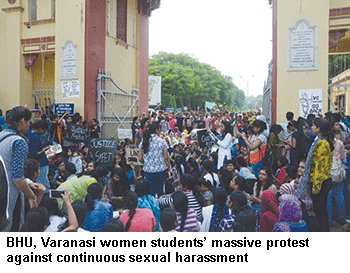 A toxic malaise has silently pervaded the Hindi heartland state of Uttar Pradesh — India’s most populous (215 million) and politically influential state represented by 80 members in the 545-strong lower — and all important — house of Parliament in New Delhi. Across this sprawling (243,286 sq. km) state, an increasing number of women are being subjected to gender crimes of groping, molestation, abduction, kidnapping and rape, with impunity. According to data of the National Crime Records Bureau (2015), 35,527 crimes against women were registered in 1,528 police stations across UP. Among them, 7,885 — 20 per day — for intent to outrage women’s modesty (molestation); 10,135 for abduction and kidnapping; 3,025 — eight per day — for rape; 462 — more than one — daily for gang rape; and 91 — more than one per week — for custodial rape (by police personnel). Against this, the conviction rate is a mere 25 percent.
A toxic malaise has silently pervaded the Hindi heartland state of Uttar Pradesh — India’s most populous (215 million) and politically influential state represented by 80 members in the 545-strong lower — and all important — house of Parliament in New Delhi. Across this sprawling (243,286 sq. km) state, an increasing number of women are being subjected to gender crimes of groping, molestation, abduction, kidnapping and rape, with impunity. According to data of the National Crime Records Bureau (2015), 35,527 crimes against women were registered in 1,528 police stations across UP. Among them, 7,885 — 20 per day — for intent to outrage women’s modesty (molestation); 10,135 for abduction and kidnapping; 3,025 — eight per day — for rape; 462 — more than one — daily for gang rape; and 91 — more than one per week — for custodial rape (by police personnel). Against this, the conviction rate is a mere 25 percent.
Given the well-known reluctance of India’s — and especially UP’s — infamously corrupt police force to register crime complaints (it reflects badly on their record and the condition of the law and order machinery), it can be safely presumed that the actual number of crimes against hapless women citizens of the state is ten times the number registered. Unfortunately by accident or design, Uttar Pradesh is also the country’s most educationally backward state, ranked #34 on the Education Development Index (EDI) 2012-13 of the Delhi-based NUEPA (National University of Educational Planning and Adminstration). Therefore, its very easy for the states lazy and inept policemen to intimidate poor, illiterate citizens to desist from filing gender crimes complaints for fear of being ensnarled in legal paperwork and/or suffering loss of social reputation.
The tragedy of Uttar Pradesh — and 21st century India — is that the rising crime wave is no longer a rural phenomenon. Under the country’s Soviet-style grandiose but essentially hollow five-year plans imposed upon the nation by the Congress party which ruled post-independence India (and Uttar Pradesh) for over half a century, rural development (education and health) and the agriculture sector were shockingly neglected. This prompted the continuous migration of poor and illiterate villagers into the nations urban habitats dominated by the urban middle class. With rough-and-ready migrants from rural hinterlands having flooded the cities, they have brought with them their culture of subjugation of women and casual gender crimes which have overwhelmed urban middle class India. And increasingly under the malignant influence of Bollywood and popular cinema in which stalking, harassment, machismo and patriarchy is the dominant leitmotiv, gender crimes have become a national pandemic.
The patriarchal society which has struck deep roots in India’s most populous state has only one antidote: a strong and vibrant education system. But unfortunately for the bruised, beaten and oppressed women of the state, public education has been an almost totally neglected subject in this Hindi heartland region for over 300 years since the beginning of the British Raj. Even after India attained political independence 70 years ago, it has been a low priority for successive Central and state governments. The result of continuous neglect of elementary education is that 31.3 percent of the states massive population is comprehensively illiterate and the public school system has become a happy hunting ground for the states notoriously corrupt neta-babu brotherhood freely indulging in textbooks writing and printing rackets, teacher recruitment and appointment scams and a kickbacks culture in school construction and equipment supply contracts. Moreover, an estimated 25-30 percent of teachers of UPs 150,000 primary schools are absent every day and multigrade teaching is normative. According to the authoritative Annual Status of Education Report (ASER) 2016, 57 percent of children in class V in rural UP cannot comprehend and/or read class II textbooks, and only 23 percent can solve two-by-one digit division sums.
Inevitably, the percentage of children who enter and complete secondary education is minuscule — India’s most populous state provides only 569 government secondary schools. To be sure UP hosts 80,385 private schools, but except for a few hundred progressive schools, the majority of even private schools are promoted by businessmen steeped in patriarchy. Unsurprisingly, this conservative heartland state produces only 1.5 million tertiary education graduates annually. Moreover, education even in co-ed institutions is gender segregated.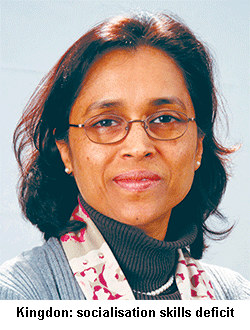
When hundreds of thousands of youth with virtually no early childhood education, which teaches socialisation skills and poor primary-secondary education fundamentals, enter their teenage years, they are completely ignorant of notions such as women’s rights and gender equality. Moreover, patriarchal social norms encourage strict sexual segregation in the childhood years and arranged marriages — economic alliances rather than consensual unions — are the norm. Consequently, its not unusual for even married men, including college and university professors, to become unbalanced in a society which encourages women’s education, emancipation and patriarchy.
“When such socially unprepared men are let loose in an under-policed, hyper-sexualised society in which scantily clad and seemingly ready and willing women are projected by Bollywood and the media, and pornography is readily available on their cellphones, its hardly surprising that groping, stalking and forced sex — and latterly gang rape which is becoming a ritual of male-bonding — have become rampant in India’s most educationally backward state. The solutions are strong preschool and primary education systems, doubling the police force, harsh sentences for sexual offences and blocking of Internet pornography sites. But these are long-haul solutions and I don’t foresee the lumpen proletariat and hindutva lunatic governments which are being elected by an increasingly ignorant electorate ever introducing such deep-rooted reforms. Hard times are ahead for the women of this unfortunate state”, says a learned professor of sociology at one of Uttar Pradesh’s top colleges speaking to EducationWorld on condition of strict anonymity.
The rule of the patriarchy, lumpen elements including some who have seeped into positions of authority and addled youth to subjugate and suppress the small minority of women in institutions of higher education capable of asserting their constitutional rights and freedoms also depresses Dr. Geeta Kingdon, professor of education and development economics at University College, London, and director of the City Montessori School (CMS), Lucknow. Certified as the worlds largest single-city school by Guinness World Records, CMS (estb. 1959) has 20 campuses schooling 53,000 children and is ranked UP’s #1 co-ed day school in the annual EducationWorld India School Rankings for the past five years.
“Its regrettable but true that the status and respect accorded to women in India is worse than countries such as Chad, Djibouti, the Democratic Republic of Congo and Ethiopia. The plain truth is that even on campuses of higher education institutions, the dominant social norms will be of the host society. Its safe to assume that 80 percent of male students of the Benares Hindu University are from within UP where the education system from primary school onward is very weak. These students are likely to have witnessed domestic violence against women and are likely to have been discouraged from developing socialisation skills from early childhood. Therefore, they are unfamiliar with notions such as gender equality, women’s assertiveness, and right to respect. Moreover, the response of the police and colleges/universities to complaints of harassment by women tends to be preventive rather than punitive, forcing women to impose social restrictions upon themselves and internalise their humiliation. One solution is to introduce gender sensitivity and equality classes for men in institutions of higher education. In wider society, the solution is to encourage women’s participation in all workplaces, gender-friendly corporations and more sexually egalitarian inheritance, pension and alimony laws”, says Kingdon, who was “shocked” to learn that women students in BHU aren’t allowed to venture out of their hostels after 6.30 p.m.
But valuable as they are, most of the suggestions made by Dr. Kingdon require systemic long haul reforms. The solutions that need to be implemented immediately are to impose severe punishment including criminal prosecution of sex offenders and rustication and expulsion from colleges/universities. Women students, too, need to join the global Me-Too name and shame movement — the prestigious Person of the Year award of the US-based Time magazine has been collectively conferred on several women who have named and shamed sexual predators in high places — and resolutely reclaim public spaces, starting with campus India.
Against this backdrop of louts and lumpens running amok in the streets of urban India and Uttar Pradesh in particular, Puja Awasthi visited several collegiate/university campuses in Uttar Pradesh including BHU and Lucknow universities, the states most prestigious higher education institutions, and filed the ground report presented in the pages following.
On the night of September 23, women students of the Mahila Maha Vidyalaya (MMV), sited within the vintage Benares Hindu University (BHU), Varanasi, established by the late Pandit Madan Mohan Malaviya in 1916, suffered perhaps the worst example of police brutality in recent memory. A few hours after prime minister Narendra Modi left Varanasi (his parliamentary constituency) to return to Delhi, lathi wielding personnel of the police and the varsitys security staff rushed into the campus of this all-womens college of BHU and unleashed a flurry of blows on students. They caned those who tried to flee, those who fell as well as those who tried to help their fallen comrades. Even faculty were not spared. Among the injured women was Pratima Gond, assistant professor of sociology and the administrative warden of one of the five hostels sited on the MMV campus, who suffered a fracture of her right hand.
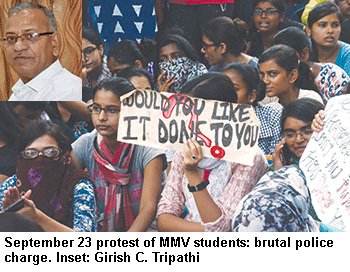 The attack on MMV women students was provoked by a protest gathering complaining against the casual response of the university authorities to repeated complaints of sexual harassment on campus. In this case, the proximate cause of the protest was the groping of a visual arts student by three motorcycle-borne men as she was on her way to the hostel on the evening of September 21. When the girl and her friends complained to the on-campus guards, they were ridiculed and rebuked for being out of their hostels after 6.30 p.m — a Saudi Arabia-type restriction imposed upon them by the university management.
The attack on MMV women students was provoked by a protest gathering complaining against the casual response of the university authorities to repeated complaints of sexual harassment on campus. In this case, the proximate cause of the protest was the groping of a visual arts student by three motorcycle-borne men as she was on her way to the hostel on the evening of September 21. When the girl and her friends complained to the on-campus guards, they were ridiculed and rebuked for being out of their hostels after 6.30 p.m — a Saudi Arabia-type restriction imposed upon them by the university management.
A day later, a complaint was registered at the local police station but characteristic disinterest on the part of the university administration proved a flashpoint, with the women drawing attention to their charter of demands submitted on September 22, which included all-night deployment of security guards, adequate lighting near their hostels and installation of CCTVs across the campus. The protesters also demanded that vice chancellor Girish Chandra Tripathi address them collectively and rejected his offer of a closed-door meeting with some representatives.
Shivangi Chaubey, an English honours undergraduate student at MMV, explains why the students rejected Tripathi’s offer. “The VC once addressed some of us on a previous occasion and said that in his opinion, girls who sacrificed their studies for the sake of their brothers should be our models. He is notoriously gender insensitive and has imposed several 19th century rules and restrictions on women students of BHU. Any gender complaint taken to him results in a sermon on ‘good behaviour’ expected of women students. This time we wanted all students to bear witness to his archaic prescription to eliminate sexual harassment on the BHU campus”, says Chaubey.
Indeed since Tripathi, an alumnus of Allahabad University who served as professor of economics at his alma mater and a well-known ideologue of the Rashtriya Swayamsevak Sangh (RSS), the right-wing Hindu revivalist cultural organisation which is the mentor of the BJP which rules at the Centre and in UP, plus a host of hindutva outfits such as the VHP, Bajrang Dal etc, was appointed VC of this vintage university (whose tenure ended in November), he has imposed bizarre rules and regulations upon MMV and even postgrad women students of BHU, which has an aggregate enrolment of 32,000 students, including 9,550 women undergrads. Thus MMV students are obliged to follow a strict dress code (no jeans, skirts, shorts etc), and are forbidden from venturing out of their hostels after 6.30 p.m (since changed to 9 p.m), and the university’s library beyond 8 p.m. Moreover, they are expected to endure rude and insulting sexist remarks and ‘eve-teasing regarded as playful banter, at all times.
Even women faculty are not spared by strangers loitering within the varsity’s 1,600-acre-plus campus which is used as a thoroughfare and also hosts a Hindu temple and hospital open to the public. Although a professor of sociology and warden of one of the five women’s hostels on the MMV campus, Pratima Gond has had to give up her early morning walk for fear of harassment. “Even in the early morning hours, I had to cope with lewd comments which are regarded as harmless ‘eve teasing'”, says Gond.
Gender sensitive male students of BHU confirm that the administration tends to make light of humiliating incidents such as groping and vulgar remarks directed at women students. “The general attitude towards harassment in the university is to dismiss verbal and physical assaults such as stalking, groping and touching women students by sundry ill-mannered males as harmless banter. After the September 21 incident, even a pro forma show of locking the gates was not done. In BHU, every girl has to fight for herself and for all the times she is molested”, says Roshan Pandey, a BA (Honours) student.
On the BHU campus, the faculty displays an overpowering reluctance to comment about the incident and its aftermath, and nobody seems to know who ordered the lathi-charge of September 23, though an enquiry by a high court judge has been ordered by the BJP state government. An official statement released by the vice chancellors office baldly denies the incident.
“There was no baton-charge on any girl (sic) on the varsity premises during the intervening night of September 23 and 24. Action has been taken against criminal and anti-social elements who (vandalised) varsity property”. This, despite the lathi-charge on women students being widely projected on national television.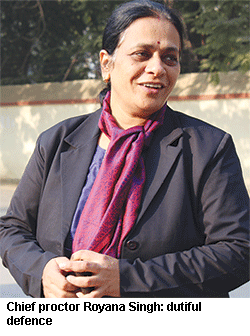
Throughout the protests, as the BHU clamped down on students and the media, Amardeep Singh, a recent graduate from BHUs arts faculty, posted videos and live updates of the violence on BHU Buzz, a social media page he manages with 15 other students. “I received two blows on my back and they tried to snatch my mobile phone”, recalls Singh, who shot the first video of protesting male students subsequently caned in front of the VC’s lodge. He has since been summoned by the police for questioning under s. 66A of the Information Technology Act (causing annoyance, inconvenience, danger, obstruction, insult, injury, criminal intimidation, enmity, hatred or ill will through electronic messages).
The only good that seems to have come out of the outrageous incident is the appointment of Royana Singh, associate professor of anatomy, as first woman chief proctor of BHU. However, Singh, an alumna of BHU, dutifully defends Tripathi.
“There was some lack of communication between the students and him but then he was ill-advised. The VC is a very nice human being. Once the inquiry report of the high court judge comes out, his name will be cleared”, she says. However, the National Commission for Women had, in a statement issued on September 26, especially described the VC’s statement — “if we are going to listen to every demand of every girl, we wont be able to run the university” — as “irresponsible”.
Curiously, chief proctor Singh is averse to a common-sense proposal made by students to establish a gender sensitisation committee against sexual harassment. According to her, department-level complaints committees are sufficient to deal with students grievances. “We have set up barriers, increased the number of on-campus guards, installed better lighting and have enhanced patrolling by rapid response teams”, she says, detailing the improved women’s safety and security measures taken by her.
Although most women students agree that she is dedicated and committed to her new job, they reckon these initiatives will do little to change the mindsets of male students and faculty, which is critical for ensuring women students receive equal opportunity for participation in campus life. Thus, though hostel timings have been reset to 9 p.m, they deny women students the right to access the cyber library which is open till 11 p.m, and CCTVs haven’t been mounted in public areas but on hostel gates, facing inwards, to police students activities rather than to record movements of predatory males lurking outside the gates, looking for opportunities to harass women students.
Although currently BHU, which ironically is celebrating its centenary year, has been in the eye of the storm for all the wrong reasons — the late Pandit Madan Mohan Malaviya, a brilliant lawyer, educationist and social activist must surely be turning in his grave on witnessing such gender discrimination at BHU — the oppression of women students struggling to break free from the shackles of patriarchy, is a statewide phenomenon in contemporary Uttar Pradesh.
In October 2016, a woman student of Lucknow University (LU, estb. 1921) submitted a harassment complaint against a lecturer at the university. In her two-and-a-half-page plaint, she detailed a history of inappropriate behaviour by the lecturer who had also threatened to fail her if she outed him. A subsequent Internal Complaints Committee comprising six members, however, submitted an inconclusive report to the VC after two months of investigation. Comments Amita Bajpai, dean of LUs faculty of education, “The report was inconclusive because the girls claim could not be recreated on the scene of crime”, without explaining how such a recreation could have been possible.
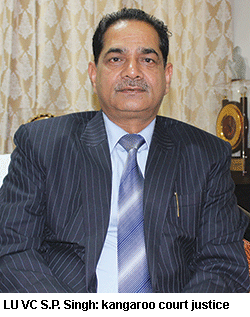 Surendra Pratap Singh, the incumbent VC of the 25,000-student strong LU, explains away the matter as “nothing of the sort”. “It seems as though the complaint was the result of rivalry between faculty members”, he says.
Surendra Pratap Singh, the incumbent VC of the 25,000-student strong LU, explains away the matter as “nothing of the sort”. “It seems as though the complaint was the result of rivalry between faculty members”, he says.
Since then, Singh has devised, what he believes, is a foolproof sexual harassment resolution system. He summons guardians/parents from both sides and gives the parties a dressing down/counselling and takes written apology letters. “Sometimes relations develop between two people and then one party takes them in another direction”, he says, explaining his understanding of why sexual harassment complaints are made.
Despite his exalted academic position, Singh seems unaware that his archaic kangaroo court disputes resolution system which is inapplicable to the multiplying regiment of unemployed and unemployable street toughs and rowdies who while away their time harassing and molesting college and university women students, is not far removed from moral policing, which in UP has been sanctified in the form of government constituted Anti-Romeo Squads (of un-uniformed/plain-clothes policemen) set up in March 2017 to keep molesters in check. These squads, especially active around school and college campuses, drew widespread criticism for harassing couples — including siblings and the married — and blatantly misusing their power to extort ‘fines’ from them. Now renamed the Nari Suraksha Bal (Women’s Protection Force), the 1,000-strong group has been re-oriented to desist from imposing its own patriarchal moral codes on couples.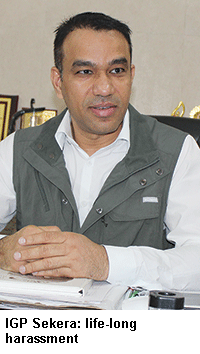
Navniet Sekera, Inspector General of Police, Women Powerline, UP, concedes that deeply entrenched patriarchy gives women very few options — on or off campus. “In our social system, girls are discouraged from speaking up. They don’t complain, and are conditioned to tolerate and suffer life-long harassment. If one is courageous and gets family support to complain, she will suffer an immediate social backlash. If she still persists, years go by before she receives a summons from a court, which is likely to be unsympathetic. Thus, neither society nor the police-judiciary system gives rebel girls/women winning options”, says Sekera.
Sometimes, though rarely, women on UP’s campuses, do win. Vibha Verma (name changed) had been working as an assistant at a 4,000-plus students private university in Lucknow when the unwelcome attentions of a senior colleague, started to make her feel uncomfortable. Her ordeal continued for two years, but fear of losing her job mixed with the apprehension that her parents might ask her to resign, restrained her from speaking out. But after his attentions became too pressing, she wrote a complaint to the vice chancellor. In her complaint letter she asked for “a clean environment to work, so that I can give my best performance to the university. I am very scared of (the accuser) and do not feel comfortable with him…” she wrote.
Verma’s complaint led to the setting up of an Internal Complaints Committee, which took a month to examine the matter. She was called four times for questioning, in an environment she admits was “calm and without any pressure”. On the committees recommendation, the employment of her harasser was terminated. In the interim, Verma received support for her initiative with several colleagues recounting similar experiences of the unwelcome attentions of this serial molester. Yet, despite her victory, please note that Verma does not want her real name divulged and she is also yet to disclose her ordeal to her parents underscoring the deep shame mixed with fear that keeps women from publicly confronting the issue of sexual harassment.
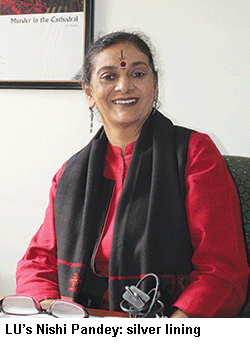 Nevertheless, spokespersons of the small minority of Uttar Pradesh’s women who are insistent upon asserting their constitutional rights of equality, freedom of movement and protection of personhood, discern a sliver of silver lining. Nishi Pandey, professor in the department of English and former chief proctor of Lucknow University, says that greater assertiveness of women on campuses is the reflection of a global trend. “There is a strong worldwide sisterhood of solidarity. Women around the world are speaking out against powerful predatory males forcing their unwanted attention on women. This gives us the courage to not quietly accept sexual harassment, but articulate our feelings and fight back”, says Pandey.
Nevertheless, spokespersons of the small minority of Uttar Pradesh’s women who are insistent upon asserting their constitutional rights of equality, freedom of movement and protection of personhood, discern a sliver of silver lining. Nishi Pandey, professor in the department of English and former chief proctor of Lucknow University, says that greater assertiveness of women on campuses is the reflection of a global trend. “There is a strong worldwide sisterhood of solidarity. Women around the world are speaking out against powerful predatory males forcing their unwanted attention on women. This gives us the courage to not quietly accept sexual harassment, but articulate our feelings and fight back”, says Pandey.
Even on the BHU campus where protesting women students were beaten and humiliated last September, younger faculty members are beginning to speak up against gender discrimination and hounding and intimidation of women students. “We are witnessing a rising demand for third generation human rights on campuses and societies around the world. The demand of women students for self-determination and equality is justified. Their right for equal access to resources and opportunities must be conceded by university managements”, says Anil Kumar Maurya, assistant professor of law.
The great majority of enlightened academics in this vitally important heartland state in which a critical war between the forces of revivalist patriarchy and modernism is being waged, believe a mix of punitive measures combined with gender sensitisation education on collegiate/university campuses is necessary to enable women students to reclaim public spaces and derive the full benefit of higher education.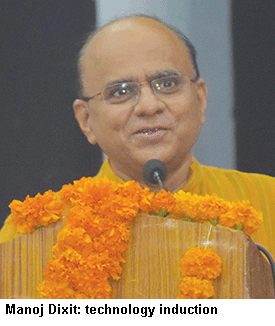
Manoj Dixit, vice chancellor of the Dr. Ram Manohar Lohia Avadh University, Faizabad (estb. 1975), is harnessing digital technology to address the hesitation of wronged women students to complain through a mobile application christened Rakshak (Protector). The app enables students in distress to send SoS signals covertly — three presses of the volume button sends out a call integrated with a geo-location feature — to enable immediate tracking of distressed women students. Moreover, the app enables victims to record and upload audio and video evidence, and the option to message the police if she doesnt want to report the matter to the university. According to Dixit, this app has the potential to radically change the lives of Avadh Universitys 2,400 students and 800,000 students in the 630 colleges affiliated with the university.
Nevertheless, Dixit believes that such technology gizmos are only a partial solution. UPs estimated 2.8 million students in institutions of higher education — and 43.5 million children in primary and secondary education — are vulnerable targets of predatory males half-crazed with graphic images of pornography accessed over the Internet. Thus male students require improved gender sensitisation education from early childhood upwards. In Uttar Pradesh, particularly, intra-state migration has fuelled a clash of values and attitudes. “With economic prosperity and mobility, college going men from the states larger cities have moved to the metros, while women from the same socio-economic strata and background, tend to be substantially less mobile. As school-leavers from the educationally backward eastern districts of the state move into cities, they import their own patriarchal archaic value premises and behavioural norms, which are disrespectful of girls and women students”, says Dixit.
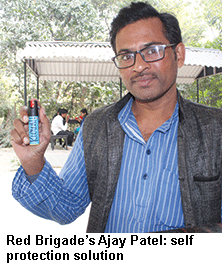 Ajay Patel, co-founder of the Red Brigade, a five-year-old group formed to assist survivors of sexual violence, says women must shed the need to seek acceptance or assistance of men. “Until women students take the initiative to protect themselves, their security will remain just a matter of dialogue and not an urgent issue”, says Patel, who is on a mission to distribute pepper sprays to women students on collegiate and university campuses in UP including BHU. This is in addition to the legal literacy and self-defence training that the Red Brigade has so far imparted to 28,000 girls and women students in the 12-21 age group across Delhi, Haryana, Maharashtra, Kerala, UP and Assam.
Ajay Patel, co-founder of the Red Brigade, a five-year-old group formed to assist survivors of sexual violence, says women must shed the need to seek acceptance or assistance of men. “Until women students take the initiative to protect themselves, their security will remain just a matter of dialogue and not an urgent issue”, says Patel, who is on a mission to distribute pepper sprays to women students on collegiate and university campuses in UP including BHU. This is in addition to the legal literacy and self-defence training that the Red Brigade has so far imparted to 28,000 girls and women students in the 12-21 age group across Delhi, Haryana, Maharashtra, Kerala, UP and Assam.
Among progressive academics and male students who are sensitive to womens rights, there is an emerging consensus that the campaign against lumpen elements who are consciously or subconsciously intent on subjugating the small minority of women who, against the odds are bent upon acquiring the benefit of higher education, is a war rather than a battle, required to be fought on multiple fronts.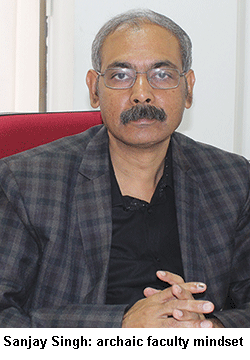
Sanjay Singh, the pro-tem vice chancellor of the Dr. Ram Manohar Lohiya National Law University, Lucknow, which was the site of a recent protest against women’s harassment, is convinced that more than students, its faculty who need to change their mindsets and patriarchal attitudes towards students socialisation. “Students come to us when they are of mature age. Therefore they don’t need moral policing or an enforced code of conduct. Instead, teachers themselves should become more socialised and better aware of modern trends in gender relations in a hyper sexualised society. Academics need to be more sympathetic and respectful of students — who after all are adults with the right to vote — rights and freedoms”, says Singh.
Admittedly, the incremental subjugation and oppression of women on college and university campuses is a nationwide phenomenon, and therefore it could be argued that the targeting of Uttar Pradesh is unfair. However it is indisputable that UP is India’s most populous state which has the largest representation in the country’s Parliament. Therefore, the outcome of the gender war being waged on the states campuses is likely to a great extent determine the status of women in 21st century India’s ‘public’ life.
During India’s freedom movement, the biggest push for independence came from this heartland state. Likewise, if the women students of BHU, Lucknow University and other institutions of higher education succeed in asserting their right to equality and other constitutional freedoms and reclaim the state’s campuses and public spaces, the ramifications will be nationwide. But right now, it seems like a tall mountain to scale.
| Hazardous land for women
Gender Vulnerability Index (2017) The country’s first-ever Gender Vulnerability Index (GVI), developed by the New Delhi-based NGO Plan India last November, measures the status of women in 30 major states in four core areas — education, health and survival, poverty and protection. GVI ranks Uttar Pradesh in second last position, just above Bihar. A breakdown of this composite ranking indicates UP is ranked #29 for poverty, #30 on protection, #19 and #27 for women’s education and health. Overall on a scale of zero to one, UP scores 0.434, below the national average of 0.531. National Family Health Survey (2015-16) The NFHS data provides a comprehensive picture of the several disadvantages suffered by women in India’s most populous (215 million) Hindi heartland state. Data culled from NFHS (2015-16) compiled by the Union ministry of health and family welfare indicates: • Only 50.2 percent of females have attended school of any type |
| Women Powerline response
The study yielded three main findings — the identity of complainants should not be disclosed; complainants should never be summoned to police stations and a woman officer should be accessible to complainants. Thus was born the Women Powerline which ensures an anonymous complaint mechanism accessible through dialing 1090 from any phone statewide. Sekera is clear about the message of Powerline. “We do not promote the image of helpless women in distress. Our mascot is a smiling girl and our tag line is chuppi todo, khul ke bolo (break your silence, speak openly). Women are not helpless, they only need the opportunity to speak out,” says Sekera. Since November 2012, when women’s Powerline became operational until November 30, 2017, 860,593 complaints have been registered by the system, of which 851,026 have been resolved (through counselling, police warnings, mediation etc). The largest number of complaints were about telephone/cell phone harassment (87 percent) followed by harassment in public places (9 percent) and on social media (2 percent). From 271 daily complaints on average in 2012, the number has risen to 598 with women students forming the largest category of complainants. The Powerline has also appointed 17,000 ‘Power Angels’ — class XI-Ph D women student volunteers — and trained them in women’s rights and legal literacy to capitalise on their spheres of influence to effect a generational change. The target is to create 200,000 Power Angels, designated Special Police Officers, who will then serve as the eyes and ears of Powerline. Babita Singh, deputy superintendent of police serving at Powerline head office in Lucknow, believes this system can provide immediate relief to victims of sexual harassment. “An instantly accessible and visible avenue for complaints has a positive psychological effect as it takes the immediate sting off the trauma. It also saves the complainant from retaliation and social shaming,” says Singh. Ajay Mishra, the additional SP of Powerline, says the system’s greatest strength is its growing deterrence power. “Mindset change takes time but going by the growing number of complaints, we can understand that hesitation in complaining against sex offenders is wearing off.” |






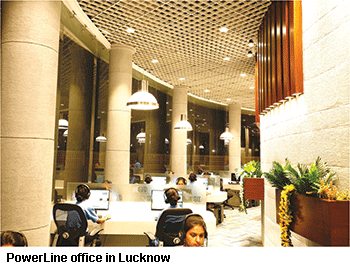 The idea of a dedicated complaints mechanism for the beleaguered women of Uttar Pradesh came to Navniet Sekera (an IPS officer of the 1996 batch) during his stint as DIG (Lucknow) in 2012. Since his days as an SSP, complaints of harassment of women were referred (through mediapersons, acquaintances etc) daily to him. The growing volume of complaints referred (one every week in 2007 to four every day in 2012) set him thinking about how many such cases went unreported primarily due to lack of reach to a ‘known’ police officer and the distaste of engaging with the police. After extensive discussions with his seniors, Sekera constituted a team of IIM professors, psychologists, NGO representatives etc to conduct a six-month study of 10,000 respondents across schools and colleges in six districts of the state to understand the problem, why it persisted and how it needed to be addressed.
The idea of a dedicated complaints mechanism for the beleaguered women of Uttar Pradesh came to Navniet Sekera (an IPS officer of the 1996 batch) during his stint as DIG (Lucknow) in 2012. Since his days as an SSP, complaints of harassment of women were referred (through mediapersons, acquaintances etc) daily to him. The growing volume of complaints referred (one every week in 2007 to four every day in 2012) set him thinking about how many such cases went unreported primarily due to lack of reach to a ‘known’ police officer and the distaste of engaging with the police. After extensive discussions with his seniors, Sekera constituted a team of IIM professors, psychologists, NGO representatives etc to conduct a six-month study of 10,000 respondents across schools and colleges in six districts of the state to understand the problem, why it persisted and how it needed to be addressed. 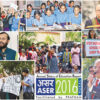










Add comment